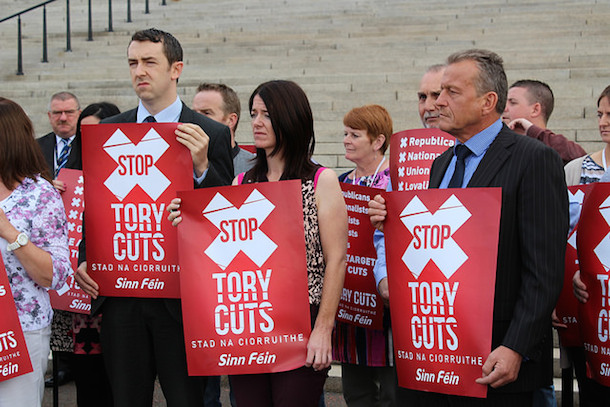13 February 2015
Sinn Féin negotiations strategy at Stormont entrenches welfare protections in legislation

THE NEW welfare legislation went through the Assembly in the North this week as a result of the Stormont House Agreement.
Serious political disagreement on the welfare issue – combined with the political impasse affecting the power-sharing and partnership government arrangements, and the convergent budget crisis for the local Executive caused by the British Government’s cuts to the block grant – nearly pushed the North into a huge political crisis.
All these issues were at the core of the Stormont House negotiations last December.
Since the Conservatives took power in Britain in 2010, their austerity policies have reduced the North’s block grant in real terms by £1.5billion.
The actual scale of these cuts was backloaded into the Executive’s 2014-15 annual budget. The financial consequence for public services and government departments has been immediate and devastating.
During this same period, and in parallel with their ideological assault on the welfare state in Britain, the Tory Government wanted to roll back the welfare state in the North.
While other parties were prepared to acquiesce to the Tories, Sinn Féin refused to give way.
A society is measured according to how it looks after those least well able to care for themselves.
The Tory welfare cuts agenda was and is counter to that ethos. So Sinn Féin from 2011 onwards opposed the proposed welfare cuts and insisted welfare protection in society was absolutely fundamental for all citizens, regardless of their background.

That is why Sinn Féin politically campaigned against welfare cuts alongside trade unions and grassroots communities.
Sinn Féin is for equality, social justice and enterprise. We believe in economic growth and competitiveness. That will not happen without investment in communities, training, infrastructure and job creation.
A major strategy is needed to grow the North’s private sector and to promote industrial development. That should not be at the expense of maintaining public services or the welfare of citizens, especially the most disadvantaged.
This perspective guided our strategy during the Stormont House negotiations.
This is why, on 18 December, when the other four Executive parties signed up for a deal on welfare, Sinn Féin refused to do so. Instead we kept negotiating.
All the other parties – including the SDLP – were prepared to compromise on welfare protections.
In fact, the welfare cuts policy came directly out of the Ulster Unionist Party’s joint manifesto and erstwhile alliance with the British Conservatives.
As a result of Sinn Féin’s determined refusal to back down on this issue, we ensured a better negotiated outcome on a welfare system for the North.
At its core is a six-year package of £565million to create, among other mitigation funds, a Supplementary Payment Fund specifically to protect children with disabilities, adults with severe disabilities, and long-term sick.

Additionally, no one in the North will pay the ‘Bedroom Tax’.
Anti-poverty measures have been retained.
The success rate for new disability applicants will be no less between the new system and previous.
During the Stormont House negotiations, the Irish Government – headed by the leaders of the Irish Labour Party as well as Fine Gael – behaved as a cheerleader for nationalising austerity on an all-island basis by actively supporting the British Government’s policy to introduce welfare cuts in the North.
By standing firm against that London/Dublin Tory axis, Sinn Féin achieved a welfare system better than the system in Britain itself by an average of £94million per year, and which represents the per capita equivalent of a €2.2billion welfare fund in the 26 Counties.
Progress was made in this key negotiation on welfare. The legislation passed this week will entrench welfare protections. But that cannot be taken for granted.
The ideological war by the conservative right-wing against the welfare state, public services, sustainable investment programmes, and democratic control of the economy has not stopped, North or South.
Their commitment to austerity is not about reducing the deficit or rebalancing economies. It is an ideological doctrine.
The Westminster election this May and a Southern general election in the spring 2016 (if not sooner) will bring the choices facing our society starkly into focus – that is between social solidarity and collective interest or the agenda of British and Irish political elites and their economic interests.
The ramifications of similar choices and challenges are already being played out in Greece.
All advocates of change should closely study that unfolding situation.
Follow us on Facebook
An Phoblacht on Twitter
Uncomfortable Conversations

An initiative for dialogue
for reconciliation
— — — — — — —
Contributions from key figures in the churches, academia and wider civic society as well as senior republican figures





